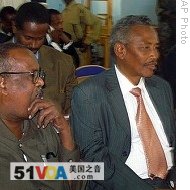Nairobi
15 January 2009
Last week, parliament members in Somalia's semi-autonomous region of Puntland elected a new president, who will have to lead the region through one of the most turbulent and uncertain periods in modern history. As a politician who campaigned for reform, President Abdirahman Mohamed Farole has vowed to eliminate piracy, corruption, and to restore security.
 |
| Abdirahman Mohamed Farole (r) sits beside outgoing President Muse (l) in Bossaso, Puntland, 08 Jan 2009 |
Mr. Farole defeated nine other candidates to win the election, including incumbent President Adde Muse whose first four-year term in office was marred by increasing acts of piracy off the Puntland coast, kidnappings of foreigners for ransom, and allegations of gross financial mismanagement and corruption.
In November, a former fisheries minister and presidential candidate, Ahmed Saeed O'Nur, begged parliament not to re-elect Adde Muse. He repeated long-held accusations that Mr. Muse and his inner circle accumulated U.S. dollars while encouraging the uncontrolled printing of the Somali shilling. The act drove down the shilling's value and created crippling hyper-inflation throughout Puntland.
U.S.-based Somalia observer, Michael Weinstein, says Mr. Muse campaigned hard for re-election but he could not stem the anger toward him and his unpopular administration.
"What changed in Puntland was a feeling on the part of the clans that he was going overboard with his corruption - that he was taking too much and giving too little. People are fed up with his corruption," he said.
Despite weeks of political tension prior to the vote in parliament, the election itself was remarkably peaceful. Weinstein says that was largely due to the intervention of clan elders who mediated between Mr. Muse and the opposition led by Mr. Farole to ensure a smooth transition of power.
"That is really important. It proves that Somalis can get their act together. The success of the Puntland elections can begin to provide a model for the whole of Somalia. It actually worked," said Weinstein.
It also helped that Mr. Farole, who had been finance minister under Puntland's first president Abdullahi Yusuf and planning and international cooperation minister under Adde Muse, is viewed by many people in the region as a reformist.
Puntland resident Abdirasaq Mohamed says even though Mr. Farole was not democratically elected, many people believe their clan representatives in parliament have chosen the right person to lead the region.
Mohamed says the new president has popular support because he is expected to improve the security situation in Puntland. He says the region is in chaos because of the failings of the previous administration.
Top among his campaign pledges, President Farole promised to focus on alleviating poverty by providing government funding for social and economic development programs. Noting that poverty is also fueling pirate activity off the coast of Puntland, the president said that he would fight piracy by promoting job creation for thousands of youth.
He is also expected to make good on a promise to renegotiate a highly controversial mineral and oil rights agreement signed between former President Muse and an Australian company in 2006. Mr. Farole left Puntland after falling out with Mr. Muse over the deal.
Mr. Farole, who advocates unity with Somalia, criticized Mr. Muse for awarding the contract without consulting the transitional federal government in Mogadishu and engaging in a process that he said was far from transparent. Mr. Farole says he believes Puntland's natural resources should be used to benefit all Somalis, not just one person or a region.
Weinstein says it is vitally important for the future of Somalia to have an honest leader in Puntland, who is seen taking concrete steps toward fulfilling promises.
"The bottom line is that a responsible, stable government in Puntland can stabilize Somalia as a whole," said Weinstein.
But one lingering issue is threatening to become a major obstacle toward building peace in the region.
Earlier this week, President Farole demanded that neighboring Somaliland withdraw their forces from disputed Sool and Sanag regions and urged voters there to reject the breakaway republic's attempts to secede from the rest of Somalia.
Somaliland Foreign Minister Abdullahi Mohamed Du'ale expressed anger, saying the Puntland leader's comments are a major set-back for relations between the two rivals.
The dispute over the regions of Sool and Sanag in northern Somalia began in 1998, when Puntland formed and declared the regions as sovereign territory based on the ethnic make-up of the region's inhabitants and their clan ties to Puntland.
Somaliland claims Sool and Sanag because the regions fall geographically within the borders of pre-independence British Somaliland. Somaliland declared independence from Somalia in 1991, but is not internationally recognized.